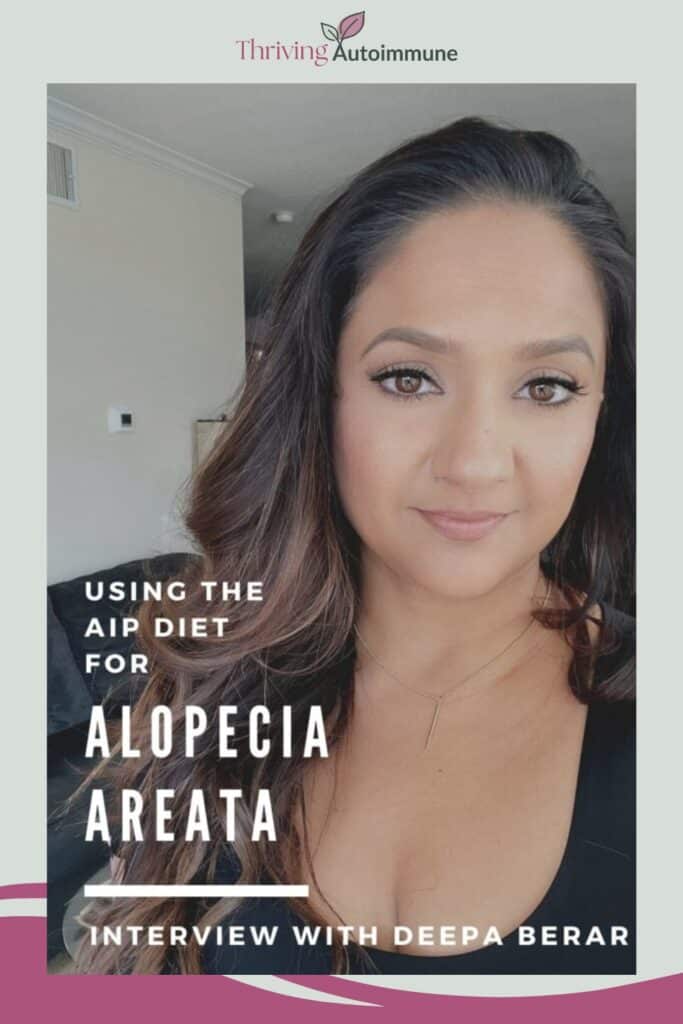This post may contain affiliate links. Please read my disclosure policy.
l interviewed Deepa Berar, who is an inspiring Alopecia YouTuber, about how she has used the AIP diet, stress-relief, and other modalities to regrow her hair from Alopecia Areata.
You can either watch the interview or scroll past the video and read the transcript below!
Rather watch the video on YouTube? Go here to see it.
The Interview Transcript:
Michele Spring:
And hi everyone, this week, I have a special surprise for you. I have a Deepa Berar, who is also a YouTube star as well. She's amazing. She has alopecia areata and she's going to talk a little bit about that. What's her journey, what she's gone through, what she's done to help with that. And I know a lot of you have also alopecia, but also other autoimmune diseases that may benefit from listening to this. So I want to go ahead and welcome to Deepa.
Deepa Berar:
Thank you for having me. I really appreciate this opportunity to reach out to your community and to shed a little bit more light on everything auto-immune, alopecia, all of it.
Michele Spring:
Yeah, it's great to have you.
Deepa Berar:
Thank you.
Michele Spring:
So let's go ahead and get started. So we've already established that you have alopecia, but can you give us a little bit more background on that? Because like I mentioned, a lot of people in my community have different autoimmune diseases, so they may not really be familiar with it or kind of know a little bit about it, but just enlighten us a little bit more.
Deepa Berar:
Yeah, for sure. So there are several different types of hair loss that exist. And one of them that is pretty common is alopecia areata. And what sets alopecia areata apart from the other ones is kind of the appearance of it. And also the fact that it's autoimmune related. When I lost my hair, it was in big, bold patches. So, here and here, there was behind my ear on both sides. And then it was overall thinning. But when I say bold patches, I mean, if you touched it, it was completely smooth. You couldn't feel anything. It was as if you would look at it and you would think, “My hair is never going to come back in that spot.” That's how smooth it was. And like I said, there's so many different types of alopecia that exist, but alopecia areata in particular, that's what it looks like, and it happens pretty quickly. Mine was 70% loss within the span of five months.
Michele Spring:
Oh, that's a fast amount of time.
Deepa Berar:
Yeah.
Michele Spring:
Did you have any indicators prior to that, that something was going wrong with your body or did it just kind of happen?
Deepa Berar:
So I did notice one interesting thing. It was my manicures that told me that I had pits in my nails and it was on all of my nails at the exact same spot. And so it was a little line where it looked like a pit and it was just basically growing, and they were all growing at the same rate. It was just the weirdest thing. She said that there's something going on, you need to figure out what's going on in your body that is causing this. And I wonder, what else did I… I think it was just the hair loss that I was really noticing, but there was more hair on the floor, there was more hair on my brush. At the time, I didn't really think that I was under any sort of stress.
Deepa Berar:
I was in a long-distance relationship with my now husband. So we now live in San Diego, but I grew up just outside of Toronto. And so I was traveling back and forth. I was doing all the traveling back and forth and working for part of the time in Canada and then coming and spending a month with him out here and then going back. And so it was a lot. So when I look back at it now… And on top of that, my YouTube channel before alopecia, was all makeup tutorials and hair tutorials. So I was doing a lot of that stuff, working with brands for makeups tutorials, working with brands for hair shows, going to events. There was a lot and then on top of that, I was a professional makeup artist. So I was actually working too.
Deepa Berar:
So there was a lot that was going on at that time. And if I stepped back and looked at myself as if I was my friend or something like that, if I looked [inaudible 00:04:20] that's my friend and that's what she's doing. I would think girl, like relax, you need to take some things out of your plate. You're working too hard. You must be stressed out, but I didn't know it at the time. And I think a lot of people can identify with that because we don't know that we're stressed, but we really are.
Michele Spring:
Oh yeah. Me!
Deepa Berar:
Yeah.
Michele Spring:
So was it pretty easy then for you to get a diagnosis since you actually had like those physical symptoms like that?
Deepa Berar:
Well, so, okay, when it started falling out, it was, let me see… It was like August, I think of 2016. And when it really clicked in where it was an issue was right before I left to come to California to stay with my husband and I was going to be here for three months. So at that point we weren't even in… I don't think we were engaged even at that point. So I didn't have healthcare out here. So I didn't see my doctor. I didn't really see anybody. I talked to a naturopath when I was out here, I think, did I hire her afterwards or before? I can't remember now it's so long ago, but either way, I didn't really get a diagnosis until I went back home in December. So it was at that point I had the patches, I had all the things going on. It was completely noticeable and it was three, four months later that my doctor was like, yeah, that looks like alopecia areata.
Michele Spring:
So what was going through your head at this time? I mean, being a beauty makeup, artists blogger and I mean all of this, like that was your identity, right? So losing your hair, I mean, what exactly were you feeling at the time?
Deepa Berar:
It was really tough. I mean, all I knew about alopecia was this one client that I had. So I used to work in Mac and I am at cosmetics. And I remember I had this one client come in that wanted to have her makeup done. And it was for her baby shower and she had alopecia and she had nothing. She had no hair on her head on her body. She had no lashes, no eyebrows. I had to figure out where her eyebrows should be [inaudible 00:06:46] those in. Figure out where her lashes would be, do the false strips, all that stuff. And she was telling me about her alopecia and that's all I knew. I didn't even know that it didn't go away. That you could potentially lose some of it but not lose all of it. I thought that that's where I was headed and I didn't… I read a lot of things on the internet and tried to figure out what's going on, but you have that initial feeling that something's going on with me, I'm going to die.
Deepa Berar:
I think that's where a lot of people's minds… That's the first thing. So I didn't tell anyone either. I told my husband and that's only because he was right there. He saw the whole thing happen. I didn't tell my parents. I didn't tell my best friend until I was maybe a couple of months into it. And we tell each other everything. And it's scary, it's a scary thing when you don't know what it is, and you don't know anything about this disease. And I have a friend who's a dermatologist and so I called her up and she said that the only things that they can recommend are steroid shots or steroid creams or Rogaine. And I looked into that and I found out these are all temporary things doesn't mean just because you get the steroid injection in that one patch, you can fill in that bald spot.
Deepa Berar:
You can, but it doesn't guarantee that it's not going to pop up again somewhere else. So to me, all of these things looked really temporary and it wasn't until I found a couple of videos, it was just very early on when people were just… they had other channels and they were just like, oh, this is what is happening to me. And I just want to share it with you guys type thing. And two people that I had watched that had said that it was linked to gut health. That I was like, oh, and that they were able to grow their hair back by changing their diet by implementing the AIP diet. And that was a light bulb moment. That was when I was like, I don't care if it's like this tiny sliver of hope I will grasp at that. That's all I need.
Michele Spring:
So then did you just implement the AIP diet right there? Or did you… What happened?
Deepa Berar:
So well. Okay. So first I was best friends with the people at the whole foods, for sure because I would go every week I was like, give me a new supplement. I want a supplement, let me know, what can I take? Thinking that my answers are at the bottom of some sort of jar of pills. And I mean, not to say that that doesn't help, but definitely if you are deficient in things that is very important to find out what's going on with that. So I was actually deficient in D B12 and iron, which is like the triple threat. If you want to lose your hair, go get yourself low in those and it's going to happen. So I supplemented those and then when I found out about that video, I started that… So that was two months in the video that I watched was two months into my hair loss journey.
Deepa Berar:
So then I told my husband, I was like, yeah. I was like, I want to do this. And he's a chef so he was like, okay. So he was like, tell me what you can and cannot eat. And he's like, I'll make sure that that's what we're doing. So he was a huge, huge support in all of it. And yeah, so I did the AIP diet and everyone that like, well, not everyone, but people on my channel will ask, oh, did you have cheats? Did you cheat? Did you cheat? And I'm like, first of all, I'm trying to learn that cheat is not a good word when it comes to food. But no, I would say that I ate 95% strict AIP, and I only say 95% because I did use black pepper every now and then.
Deepa Berar:
And if I went to a restaurant, I wouldn't stress out so much about what was going on behind the door, the closed doors. I would order my meal AIP, as best as I could. Talk to them about what oils are you using? What seasonings, whatever. But if something happened back there in the kitchen, I'm not going to stress about it because as we know, stress is one of the biggest triggers for autoimmune issues. So, yeah, so I did that for a few months and then I could feel it. I could feel tiny little hairs poking through and yeah. And I noticed that my hair had stopped falling out at as much as it was before, because there was hair on the carpet's hair tucked into the sofa. There was hair everywhere. Yeah. Because I mean, my background is Indian and I have a ton of it. So there was a lot to lose. Yeah.
Michele Spring:
Yeah. I mean, just from Hashimoto's I know that because my husband will cook a meal and my hair still winds up in it somehow and I'm like, I wasn't even anywhere near it. So that's a hard feeling. You also say that you use a lot of stress relief and everything as well, in addition to just doing diet. Right. You want to talk about that a little bit?
Deepa Berar:
Yeah. So that's one thing that I, like I said, we were talking about that I didn't really realize that stress was such a big trigger for autoimmune conditions. But as soon as I found that out, I just tried to research how to reduce stress. What's the best ways to do it. And I came across meditation and meditation was something that just really spoke to me. I downloaded a few apps, the Headspace app, which was one of the ones that was the first one I used, because I liked that they had the intro courses. They have like intro to meditation, one, two, and three. And so I was like, okay, they're going to teach me how to do it. And it was great. And I signed up for the year subscription. I also downloaded Calm. And then my latest one that I'm loving is Insight Timer.
Deepa Berar:
That's a good one as well. But yeah, so I just started meditating every day. I did it for 10 minutes every single morning. And I started going for walks. I started doing yoga, just anything I could do just to calm myself down at that time, I was still doing makeup tutorials, but I think I fell in love with makeup again, because I was like, I can't show my hair so much. It was actually, it was interesting because at that time I actually had a six month deal with a brand deal with a hair company. And my job was to post hair styling tutorials. And this was like, right. I signed with them a month before my hair started falling out. So by the last video I actually had to use my cousin because I didn't have enough hair to… it was pretty sad. So it's like, yeah, even the worst stressful.

Deepa Berar:
But yeah, I fell in love with the makeup again. And I was like, okay, I'm just going to sit here in California while my husband's at work. And I'm going to meditate and do yoga and do makeup tutorials. And that's what I did for a few months there. And I just tried to just love everything and have fun in every single moment and just be happy. And it was easy because I was away from everyone and everything. It was easy to just not deal with everything. I think that sometimes when you're going through something like that. I know you need to have your support system. That's very important. But I think that also too, if you can eliminate people that stress you out or people that are a little bit more negative, I think that's huge.
Michele Spring:
Yeah, definitely, toxic people. I mean, when they don't support you, first of all, that can play games with your mind thinking that you're not going to be able to heal and bring you down in the first place, but then yeah. Just adding to the stress and all of that, for sure.
Deepa Berar:
Yeah. There's a lot of toxic people that just don't really know how to deal with their own stuff. And they want a buddy to pull you down, pull down with them. That's why I say to a lot of the fears of my channel. So my channel is all about hair loss. One of the things that I tell them is that with stress management, it's good to talk to a friend, but it depends on what that conversation is. If your friend wants to vent about their day, and they're the type of person that wants you to sort of go down that rabbit hole with them, maybe don't call them. Maybe that's not the friend to call. I like to think like you're… The one saying that where they say that you are the sum of the five people that you spend the most time with. This luxury of 2021 is you can spend time with virtually anyone in the world because they've got… how many people have YouTube channels have podcasts, have their interviews.
Deepa Berar:
I just was watching an interview the other day with Jennifer Aniston and she was talking about visualization. And I didn't even know that she practice it. And it was just, it was so uplifting, it was so nice to hear that. So you have to really just inundate yourself with positive messaging. That's what I truly believe.
Michele Spring:
For sure.
Deepa Berar:
Yeah.
Michele Spring:
It can so easily go the other way, but you can find stuff everywhere.
Deepa Berar:
Yeah. For sure.
Michele Spring:
Let me see. Yeah. Look through my questions here. So like you said, you started to feel some hair growing back and then did it just kind of start snowballing or just continue from there?
Deepa Berar:
So it started filling in, it took some time, I would say around the nine month mark, I could see my hair that was growing in. You could see little pieces here that were about two to three inches long, and that was kind of happening all over the place. It didn't all grow in at the same rate. I had parts that were longer than others, but slowly it started to come back. I did have one patch on my temple that didn't fill in, it started to fill in, but then it cleared back out because I was under stress again. And I started researching alternative therapies for hair loss. And then I tried a bunch of different things. So I found essential oils really helps. And I started using the Irie store light therapy device. So it's like kind of looks like this helmet emits like red LED lights.
Deepa Berar:
And the whole idea is that it enhances circulation at your scalp. So it helps to keep your hair in the growth phase of the hair growth cycle for longer. And it helps to also… anything that you can do to encourage circulation at your scalp is really good because it can deliver more of the nutrients to your hair follicles. But that's the thing is that the nutrients have to be there. You have to be following that right diet that has a nutrient dense diet that will be able to help with that.
Michele Spring:
I wonder if that would work with Hashimoto's hair loss as well. I was listening to a podcast today, said if you touch your nose and it's cold, then usually you're losing circulation from above, like up here and above. So I thought it was interesting.
Deepa Berar:
[touches nose]
Michele Spring:
I keep doing that, I'm like it's cold out or?
Deepa Berar:
That's interesting.
Michele Spring:
Yeah, but it's one of the components. It was Dr. Kharrazian. He was talking about just the different components of hair loss and he mentioned the vitamins you have to have those particular vitamins and then the circulation as well. And then thyroid hormones have to be right. And you also can't have the auto-immunity in the background constantly attacking. So I would assume is the same thing with alopecia. You can't have the tissue being attacked and try to regrow it all at the same time. So you have to tame that down.
Deepa Berar:
Spend some time eliminating all the things that are not doing good things for your body, so.
Michele Spring:
Right.
Deepa Berar:
Yeah.
Michele Spring:
And then give it all the things it needs.
Deepa Berar:
Yeah. But who knew? Right? I mean, I didn't know before I went through this whole thing. I didn't know that diet could affect you that way.
Michele Spring:
Yeah, no, I know it's, I mean, I grew up eating crap basically the whole time and so.
Deepa Berar:
I mean, we had a lot of Indian food in our house, which is good because there's a lot of turmeric and garlic and ginger and all those good things. But I mean, when we went to school, in our lunches, we had all sorts of not so good for you treats, we had sugary cereal for breakfast. On the weekend we'd have McDonald's, pizza all the time. And then by the time you get to university and you can fend for yourself. You're just like, oh, Taco Bell sounds fantastic. It's like, no, but it's not really fantastic for your body.
Deepa Berar:
Yeah. So we were the same and then also not to mention alcohol, which is so pervasive in our… Especially I think in a lot of cultures but… So where I'm from in India is the Northern part it's called Punjab and Punjabis are notorious, not everyone, but obvious… So don't come after me people, but in our culture, a lot of people drank a lot. And so yeah, learning about how food really affects your body, how alcohol and all the toxins can affect your body. It's just like, oh my gosh, no wonder all these things happen and how much auto… Sorry, how much auto-immune or how many auto-immune diseases exist in this world? How many people have it? I was reading something the other day that said, I think it was 50 million people in America,
Michele Spring:
Yeah, just America alone.
Deepa Berar:
And there's like, how many? What is it? 300 million people in America? Is that the stats? Its like one in six.
Michele Spring:
Yeah. It's like 20%, I think. Yeah. It is crazy. I mean, we're killing ourselves. I mean, it's not our fault, we're living with what we know, but it's one of those things we've just been kind of taught to eat this way. It's just the way we're brought up and then this is what's happened, so.
Deepa Berar:
Yeah. And I think that's why it's great that like channels like yours exists because I feel like it's bringing more… It's informing people, that's the only way that we're going to be able to bring it down is by letting people know, well, no, this is what it's doing to you. And no, it's not that hard to switch. I mean, it's adjustment for sure but the more you eat this way, the easier it becomes. And look now, I mean, five years ago there was no cassava pasta. There was no, Paleo [inaudible 00:22:35]. There was no Paleo cookies. There was nothing. And now it's like, oh, I can order this and I can try that. There's so many things that exist out there to help you, so.
Michele Spring:
No, exactly.
Deepa Berar:
Yeah.
Michele Spring:
So how do you eat now? What's your diet?
Deepa Berar:
So right now I'm eating Paleo.
Michele Spring:
Okay.
Deepa Berar:
Yeah. So I actually have, which you and I were talking a little bit about this before, but I have a few different autoimmune conditions. And so recently one of my other ones has kind of flared up, so I, well not flared up, but it's kind of a long thing. I'm going to share it at some point, but it's a long thing. But anyway, so I'm dealing with that right now. So I did do AIP again for 30 days. And then I transitioned into Paleo, which, I mean, when you go from AIP to Paleo, you feel like you can eat anything. It's the craziest thing but if you were to go the other way around, if you were to go from a regular standard American diet to Paleo, you would think, oh my God, I can't eat anything but no. Try the other way round. It's wonderful.
Michele Spring:
Yeah. It does give you a perspective for sure. I typically eat Paleo as well.
Deepa Berar:
You eat Paleo as well.
Michele Spring:
But I'll do AIP if I have a really bad flare or something. And I feel the same way because I don't usually do the whole entire reduction process anymore.
Deepa Berar:
Yeah.
Michele Spring:
I'll do AIP just more for a reset or just to kind of calm everything down. But yeah, when I go back to Paleo, it's like woo-hoo!
Deepa Berar:
And like I said, there's so many things that exist out there that help. All of the cassava pastas saving my life. Yeah. And the wraps and yeah, there's so many things.
Michele Spring:
Yeah. Let's see. What would you say was the hardest part of doing AIP, other than saying it was for you?
Deepa Berar:
The hardest part I would say probably I would say going to people's houses. That for me, I think is probably the hardest to deal with because especially in Indian culture. I mean 99% of our food contains seed based spices. So it's like, you really can't eat. There's not really much that you can eat when you're at someone's house. So that's difficult. But I mean, I don't think, I don't know. I think because I've done it now so many times or for so long, I feel like it's so much easier the more you do it, the easier it becomes, but maybe the other thing would be learning exactly what you can and cannot have. That takes a minute to get used to. So I would say that if you're going to start it to definitely have your lists, print things out, put them on your fridge or put them wherever, make copies, just so you remember and you know. Once you get used to it and it becomes habit. It can take a minute to figure it all out, to learn it.
Michele Spring:
That's definitely true.
Deepa Berar:
Yeah.
Michele Spring:
So when you say you're going over people's houses, like a fellow Indian, relatives or whatever. Do they get offended when you don't want to eat them? I mean, what's going on there? Are you bumping up against that or is it more like you've explained to them prior that you have to do this?
Deepa Berar:
So I think, like I said, in our culture, we don't really talk a lot about what we're going through. I am on the other end of this whole thing, because I posted my alopecia story. I posted all these things because I want to bring awareness. I don't feel it's right to suffer in silence or to hide things behind closed doors. I think that if you are going through something, if you figured out how to deal with it, you should help other people. And it doesn't matter if it goes against what your cultures norms are. That's how I personally feel about it. That's why I posted it all. But in our culture, we don't really talk about it. So going over to somebody's house, it just feels like it makes it such a big deal.
Deepa Berar:
Not that I don't tell people what I'm going through, but I also don't feel comfortable making people order something for me or making something special for me. So what we'll try to do is just bring over a dish of your own, and that's what you're having, but it's also hard because it's all the things that you love to eat and all the smells and everything. And you're seeing everybody else eat it. It can be a little bit difficult, but if you just, I think make sure that you're not starving before you go over there and take your own dish that it definitely does help.
Michele Spring:
Okay. That's good to know. Let's see. You kind of gave advice for what people do and I guess, do you have any other thoughts or advice that you'd like to share? I mean, autoimmune disease in general or alopecia or whatever?
Deepa Berar:
I think with autoimmune disease in general, just know that you can actually do something about it that you don't necessarily have to suffer in silence. You don't have to have this outlook of this is what's going on with me and I'm never going to get better. You can actually be proactive. You have to be proactive about it and you have to implement a lifestyle change. You cannot do this for a few months and then just go back to the way life was before. Thats not how it works. When you have one autoimmune condition, you are more susceptible to others, you have to take care of your body and you have to make yourself your priority. Your biggest priority has to be you and your health.
Deepa Berar:
I just, I feel so strongly about it now that I've been through it and then I'm going through it again. It's just all the things that we grew up thinking about… I remember having conversation with my mom and my mom was saying something about like, why would they sell these foods if they're so bad for us? It's like, yeah, right? Because a lot of these companies, they're not thinking about our health. So you have to be proactive and you have to take your health seriously. And just know that these tools exist, resources like your channel to help people that are going through things that you can actually implement a complete lifestyle change and you get your health back. And when you know what it feels like to feel good, you will never want to feel bad again.
Deepa Berar:
And don't think it's going to be a perfect journey because it's not going to be a perfect journey. I can say that from firsthand experience, it is not a perfect journey. You will have moments where you're frustrated and you don't want to do it anymore. And you want to eat whatever and drink whatever and all that kind of stuff. And you might do that, but that's okay because you just get back on it and you have to just keep going. And then with hair loss too, I think the biggest thing that I want to say about hair loss that I have learned in all my five years of researching now is that hair loss, your hair is your body's last priority in terms of what it wants to do. Its functions, its number one priority is to keep you alive and functioning. And then it's going to deliver nutrients. It's going to deliver the nutrients in that priority sequence and your hair and your nails and your skin are at the very bottom of that priority list.
Deepa Berar:
So don't be surprised when your hair falls out in that case, if you are suffering from something and there's something going on in your body and your gut is completely out of whack. Just know that you can actually heal your gut, heal your body. And that just have faith that your hair will come back.
Michele Spring:
All right.
Deepa Berar:
Yeah.
Michele Spring:
Great.
Deepa Berar:
I feel so strongly about these things.
Michele Spring:
Where can we find you if you want to learn more?
Deepa Berar:
So I have my YouTube channel. It's my name. So Deepa Berar. So D-E-E-P-A-B-E-R-A-R and then on Instagram as well, Facebook, everything's under my name. You can find me.
Her website: https://deepaberar.com/ and her Instagram: https://www.instagram.com/deepaberar/
Michele Spring:
Well, thank you so much for joining me today. I've learned a lot and I think everyone else will as well. And I really appreciate it.
Deepa Berar:
Thank you. I really appreciate the opportunity to chat and I'm looking forward to seeing more of your videos.
Michele Spring:
Me as well for yours. Not my own, ha! Thank you. And that's it. Thank you so much for joining us on this special interview. I really appreciate it. And if you have any comments, any words of encouragement for other people going through this, anything like that, please comment below.







OMG, Dear Michele! You are wonderful!! How do you know that I have currently an issue with hair loss?? *lol* 😀
Thank you so much for your inspiration and that really interesting interview with Deepa. I’ll enjoy.
Best wishes from Germany! *hug*
I know everything, lol! Just goes to show you you aren’t alone, right? Glad you enjoyed it!